D.M.C. Discusses Future of Hip-Hop with Summer Students
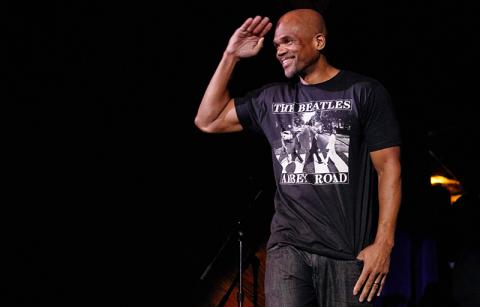
Darryl "D.M.C." McDaniels of the pioneering hip-hop group RUN-D.M.C. at Berklee summer clinic
Photo by Dave Green
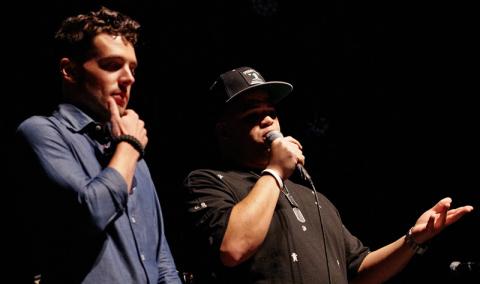
Alumnus Dawaun Parker '05 (right), a Grammy-winning hip-hop writer and producer who works with Dr. Dre’s Aftermath Entertainment label, introduces Phil Beaudreau (left). Parker produced Beaudreau's debut album, "Ether."
Photo by Dave Green
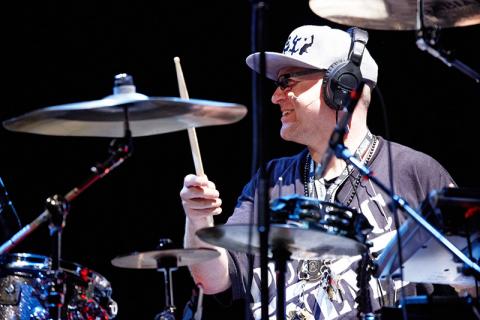
Drummer extraordinaire and alumnus Swiss Chris '96, known for his work with John Legend, at Berklee summer hip-hop clinic
Photo by Dave Green
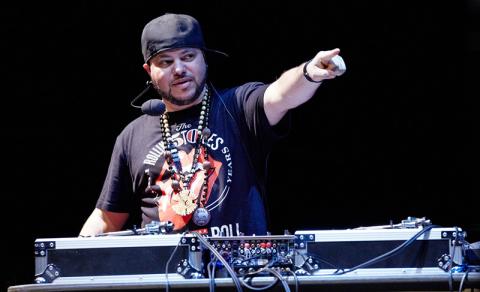
Johnny Juice of Public Enemy's Bomb Squad at Berklee summer hip-hop clinic
Photo by Dave Green
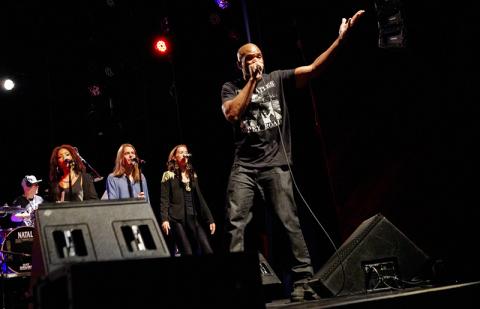
In addition to answering questions from students, D.M.C. and others performed with Berklee students and faculty at the hip-hop clinic.
Photo by Dave Green
“I’m a jazz saxophonist,” said the student, a participant in Berklee’s Five-Week Summer Performance program. “How can I get into hip-hop?”
He posed the question during the Q&A portion of a Berklee hip-hop event, “The Truth of Recycling: The Commonality Between Drums and Turntables,” held on Tuesday, August 5, 2014 at the Berklee Performance Center. The afternoon seminar for summer program students featured hip-hop pioneer Darryl “D.M.C.” McDaniels of RUN-D.M.C.; alumnus Dawaun Parker ’05, a Grammy-winning hip-hop writer and producer who works with Dr. Dre’s Aftermath Entertainment label; Johnny Juice of Public Enemy’s Bomb Squad; and top session drummer Swiss Chris ‘96, who has worked extensively with John Legend.
Watch excerpts from the summer seminar here:
“A lot of people wouldn’t be here today were it not for this gentleman,” said Rob Rose, vice president for special programs, as he introduced D.M.C., who replied to the student’s question with some strong words of advice: “You guys writing, singing, and playing are the roots of music, forever.” All music is one, according to D.M.C., the man who helped merge the worlds of rock and hip-hop with his group’s classic remake of Aerosmith’s “Walk This Way.”
“For me, there would be no hip-hop if there was no rock,” D.M.C., who sported a black Abbey Road Beatles T-shirt, said. “There would have been no rock ‘n’ roll if there was no blues.”
“You don’t have to ask permission to be you and do your music,” he told the student. “You don’t have to have permission for the art inside of you.”
The mashup history of popular music was the order of the day, with Johnny Juice and Swiss Chris presenting a concise history of hip-hop sampling, from the Sugar Hill Gang’s sample of Chic’s “Good Times” for “Rapper’s Delight” to Beyonce’s usage of portions of the Chi Lite’s “Are You My Woman (Tell Me So)” on “Crazy in Love.”
D.M.C., performing with an all-star band featuring Berklee faculty and students, opened the event with all-the-way-live versions of Run-D.M.C.’s “Mary, Mary” (based on a song originally performed by the Butterfield Blues Band and later by the Monkees) and his hip-hop version of “Black Betty,” which was a popular rock hit for Ram Jam in 1977 although it originated as an African American work song and was first recorded in the ‘30s.
It was the kind of event that celebrated music in all its forms, and that showcased how hip-hop culture has made something new of all the music that came before it.
To Johnny Juice, hip-hop is not a type of music so much as it is “a filter that’s within.”
Juice noted that, if he takes two rock records and syncs them together, it becomes a hip-hop track. “If I put them back in their sleeves,” he said, “they’re two rock records again.”
Whatever style one writes or plays in, Juice told the students, his advice was simple: “Write songs that we’ll have to sample in the future.”
Parker, who has written and produced for 50 Cent, Busta Rhymes, Eminem, Jay-Z, and Snoop Dogg, among others, nodded to Juice, explaining that Dr. Dre and the crew at Death Row Records have looked to the Bomb Squad—the hip-hop production team known for its work with Public Enemy—for inspiration.
“They were trying to make the West Coast version of that,” Parker said.
Parker said Dre is a perfectionist and a “musician in his mind,” while another superstar hip-hop force that he works with, Eminem, is a world-class instrumentalist. Parker said that Eminem is “a polyrhythmic drummer like Vinnie Colaiuta,” name-checking the renowned drummer and 1975 Berklee alumnus.
According to D.M.C., who is 50, the up-and-comers of today have some advantages over earlier generations. For one thing, there is a difference in the available technology: “We didn’t have iPhones,” he said, pointing at Juice’s turntables. “We carried our records in crates.”
An hour or so after the event ended, graduating rock singer David Vives sat with friends at a coffee shop around the corner from the Berklee Performance Center. Vives recently sang “Whole Lotta Love” and other Led Zeppelin tunes at Berklee’s commencement in May, with honorary doctorate recipient Jimmy Page looking on approvingly, but performing with D.M.C., as he did to close the Five-Week Summer Performance program event, was just as thrilling.
“‘Walk This Way’ was my childhood,” he said. Now it’s a part of his budding career.
James Sullivan is the author of The Hardest Working Man: How James Brown Saved the Soul of America.